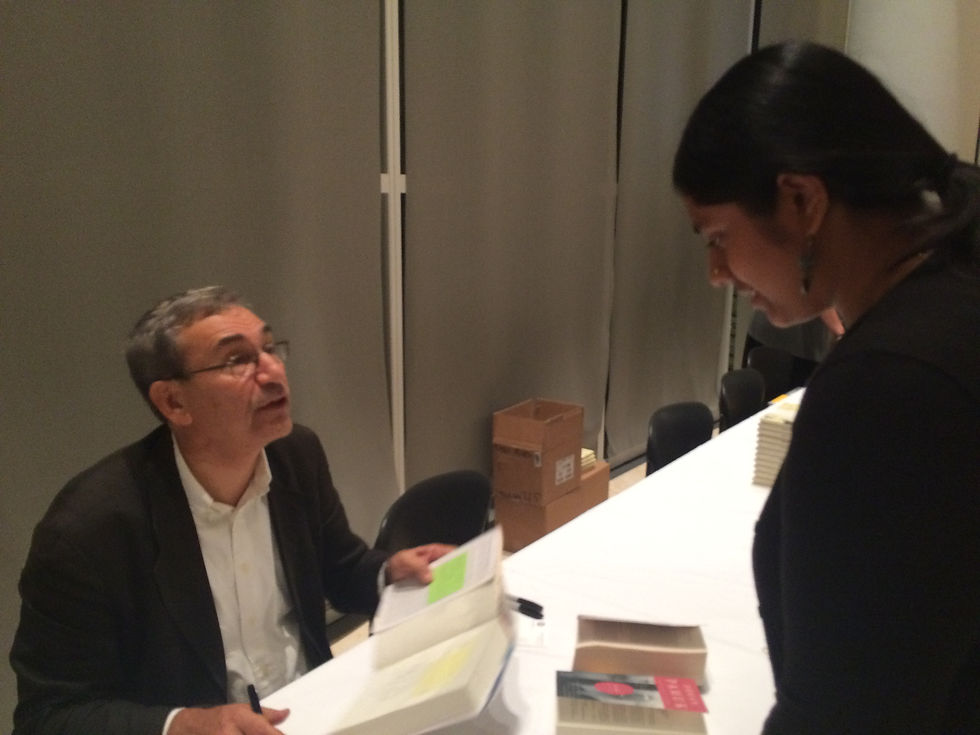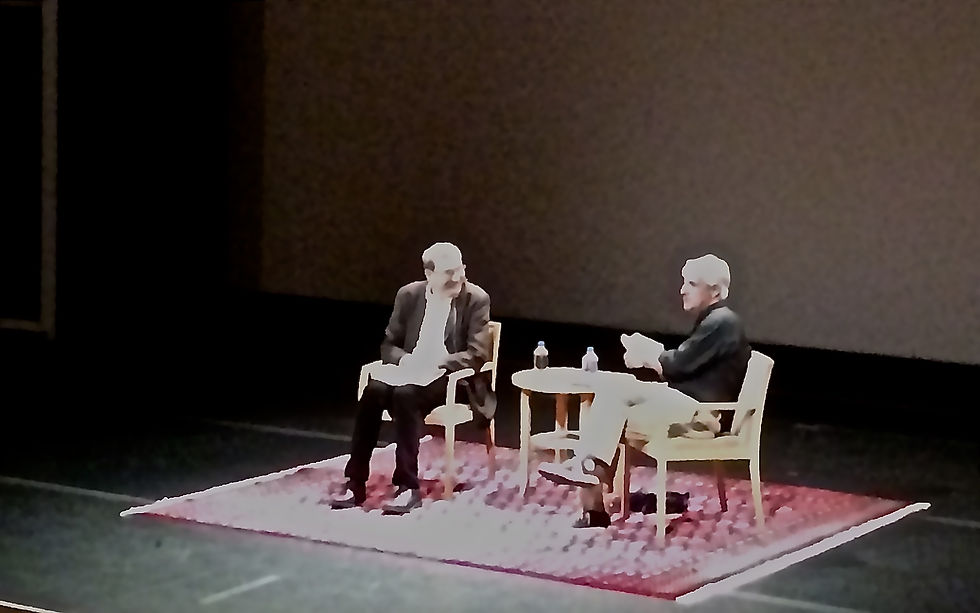When Constellations Become Galaxies: A Night with Turkey’s Greatest Literary Star
- By Megan Cole
- Dec 2, 2015
- 4 min read

Turkey’s best-selling novelist, Orhan Pamuk, headlined the Getty Museum’s 360 Lecture and Performance Series on Oct. 28, encouraging an audience of hundreds to approach writing as a delicate art, and to find the inspiration for great novels in the most familiar surroundings.
On the chilly October night of Pamuk's free lecture, "The Art of Writing," more than 200 patrons lined up against the Getty balcony overlooking the City of Angels in anticipation of the author's appearance. Pamuk, an Istanbul native and author of more than a dozen novels, is Turkey’s most highly-acclaimed contribution to the modern literary canon. His novels have been translated into 60 languages and have amassed readership worldwide, including a sizeable fanbase in Los Angeles. Something about this man, something about the enchanting world contained in each of his books, is mesmerizing to his readers, who braved the Southern California rush hour from all over Los Angeles county just to see him speak at the Getty, and to hope that his "art of writing" might rub off on them, too.
Nineteen-year-old Janani Venkateswaran fidgets in the line filing into the brightly-lit auditorium. Her thin arms are piled with dog-eared copies of five of Pamuk’s latest novels, which she hopes he might sign after the lecture. One of the novels – A Strangeness in My Mind, which follows the life of a Turkish street vendor – she hopes to bring back to her hometown in India while on break from college this December, as a gift to the high school drama mentor who first introduced her to Pamuk.
“Pamuk is the reason I love drama and literature so much; he’s the reason I want to write a novel someday,” she grins. “There’s a chapter in one of his books, Museum of Innocence, called ‘The Happiest Moment of my Life’ – I think this is one of mine.”
As the wide, mahogany doors swing open, Venkateswaran, along with hundreds of once-composed museumgoers, scramble to their seats inside the Harold M. Williams Auditorium. Within minutes, the hall is jam-packed and rife with chatter, all eyes trained on the front stage, and the two empty wooden chairs on it under the spotlight.

As the clock strikes seven p.m., a curtain of silence falls over the audience and two men walk onto the stage - one introduces himself as David Ulin, Book Critic for the Los Angeles Times and moderator of the night's lecture. The other is Orhan Pamuk. The two shake hands, and Pamuk, clad in a brown corduroy suit, gazes into the hushed audience as Ulin asks him one question: “What goes through your head when you’re writing?” Pamuk, the storyteller, draws a breath and begins to divulge his secrets.
“When I write, I want to write about fifty, one hundred things all at once. I want to condense my entire world into a novel,” he explains in a soft Turkish accent. “I take these one hundred ideas and I pretend they are stars. The novel is my constellation. I take a story, and I build it in a way that connects my one hundred stars, and when I look up upon its completion, it is something natural and beautiful. A story does not just appear in a writer’s mind, it is merely the roadmap between ideas and feelings.”
Pamuk goes on to describe his upbringing in metropolitan Istanbul, in the lap of wealth and relative comfort as part of an aristocratic family. Despite his inherited riches, he exudes humility and gratitude for the life which led him to become a writer – many of his novels, focusing on Istanbul’s elite during the 1970s, are fictionalized accounts of his own young life, and reflect the culture and circumstances he grew up in. His books are so vivid and emotional because, he says, they are about “my sweet city, my Istanbul.”
“I have spent decades walking the Turkish streets which line the pages of my books,” he smiles. “My novels are an impression of my place in the world.”
It is this tangible, immersive quality to his writing which won him the Nobel Prize in Literature in 2006, and subsequent praise from the New York Times as Turkey's "best-known" author. He understands Istanbul with all of the nuance and detail that only an artist could capture, and weaves the city's sometimes-broken pieces together with all the wit and emotion of a storyteller writing about the place he calls home.
Pamuk, who moonlights as a humanities professor at Columbia University, then begins to speak about the role of novels as an upper-class invention.
“I’m about to become Professor Pamuk,” he laughs, as he explains how he believes that his privileged standing has allowed him to focus on a full-time career as a novelist. He used to write characters of high status similar to his own, but he has tried with his latest book, A Strangeness in My Mind, to experiment with lower-class characters as an exercise in diversity. It was difficult to get it right at first, he says, but he studied the streets of Istanbul for years to pinpoint the mannerisms of certain characters. Pamuk says that it is the duty of an author to strike a balance between "writing settings and characters he already knows, and learning about the lifestyles of people he does not know in an effort to give those people a voice" in his novels.
After a lull in Pamuk’s monologue, which has already slipped over an hour, an audience member waves over a docent with a microphone so he may ask Pamuk a question, his voice quivering.
“What’s it like being the greatest writer in Turkey – in the world?”
Pamuk just grins and hangs his head.
"I’m afraid that’s one question I can’t answer,” he responds carefully. “But that’s a good note to end on, for me at least, so I bid you all a beautiful night in your city!”
As the whispering audience files starry-eyed out of the Getty and into the Los Angeles twilight, the city gleaming down below the Hollywood Hills seems brighter than the black sky littered with galaxies above. Just for a second, the whole world looks like a hundred stars, waiting for their story to be told.
Photos by Megan Cole




Comments